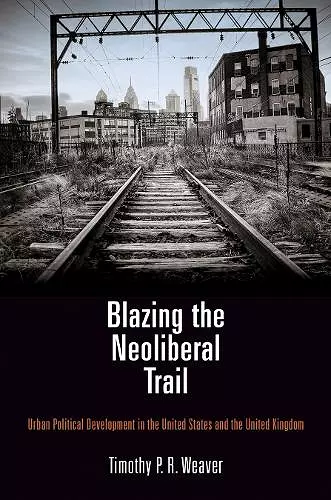Blazing the Neoliberal Trail
Urban Political Development in the United States and the United Kingdom
Format:Hardback
Publisher:University of Pennsylvania Press
Published:7th Jan '16
Currently unavailable, and unfortunately no date known when it will be back

Blazing the Neoliberal Trail asks how and why urban policy and politics have become dominated, over the past three decades, by promarket thinking. Drawing on extensive archival research, Timothy P. R. Weaver shows how elites became persuaded by neoliberal ideas and remade political institutions in their image.
In Blazing the Neoliberal Trail, Timothy Weaver asks how and why urban policy and politics have become dominated, over the past three decades, by promarket thinking. He argues that politicians such as Ronald Reagan and Margaret Thatcher targeted urban areas as part of their far broader effort to remake the relationship between markets, states, and citizens. But while neoliberal policies were enacted in both the United States and the United Kingdom, Weaver shows that there was significant variation in the ways in which neoliberal ideas were brought to bear on institutional frameworks and organized interests. Moreover, these developments were not limited to a 1980s right-wing effort but were also advanced by Bill Clinton and Tony Blair, whose own agendas ultimately reinforced neoliberal ideas and practices, though often by default rather than design. The enduring impact of these shifts is evidenced today by the reintroduction of enterprise zones in the United Kingdom by Chancellor of the Exchequer George Osborne and by President Obama's announcement of Promise Zones, which, despite appearances, are cast in the neoliberal mold.
By highlighting the bipartisan nature of the neoliberal turn, Weaver challenges the dominant narrative that the revival of promarket policies was primarily driven by the American GOP and the United Kingdom's Conservative Party. Drawing on extensive archival research and interviews with key political actors, Weaver examines national-level policies, such as enterprise zones—place-based articulations of neoliberal ideas—in case studies of Philadelphia and London. Through an investigation of national urban policy and local city politics, Blazing the Neoliberal Trail shows how elites became persuaded by neoliberal ideas and remade political institutions in their image.
"Enterprise Zones are one of many policies that have persisted over the years without the presence of much hard evidence to support their effectiveness or worthiness of public dollars. Timothy P.R. Weaver offers a compelling reason why this occurs: ideas matter more than the material outcomes they generate. The notion that ideas, more than interests and institutions, can drive decades of policy decisions runs throughout Blazing the Neoliberal Trail, and it is conveyed through a meticulous political-historical account of urban policy in the United States and the United Kingdom." * Political Science Quarterly *
"The story of enterprise zones has long deserved a full historical treatment, and political scientist Timothy P.R. Weaver provides it in Blazing the Neoliberal Trail. He casts enterprise zones, a supply-side strategy devised to unleash the restorative power of the free market on distressed urban areas, as a flagship policy in the shift from Keynesianism to neoliberalism. In telling the story of enterprise zones' uneven implementation in the US and the UK, Weaver underscores the significance of the interplay between national and local states in shaping urban political development and emphasizes the role of ideas in the neoliberalization of urban policy." * Planning Perspectives *
"By applying an argument regarding the power of ideas at the local level, Timothy Weaver is joining some of the most interesting recent work in urban politics. His careful study of the relationship between national forces and local dynamics is an important contribution." * Richardson Dilworth, Drexel University *
ISBN: 9780812247824
Dimensions: unknown
Weight: unknown
360 pages